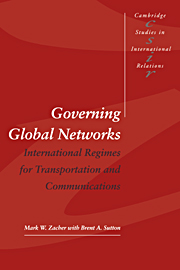Book contents
- Frontmatter
- Contents
- Preface
- Acknowledgments
- 1 International regimes and global networks
- 2 Mutual interests and international regime theory
- 3 The international shipping regime
- 4 The international air transport regime
- 5 The international telecommunications regime
- 6 The international postal regime
- 7 Normative continuities and international regime theory
- Notes
- Index
- Titles in the series
2 - Mutual interests and international regime theory
Published online by Cambridge University Press: 27 August 2009
- Frontmatter
- Contents
- Preface
- Acknowledgments
- 1 International regimes and global networks
- 2 Mutual interests and international regime theory
- 3 The international shipping regime
- 4 The international air transport regime
- 5 The international telecommunications regime
- 6 The international postal regime
- 7 Normative continuities and international regime theory
- Notes
- Index
- Titles in the series
Summary
This chapter is divided into four sections. The first addresses the concept of international regimes and the ways in which the regimes for the four international service industries are described in subsequent chapters. The second section discusses neorealist and neoliberal theories of international cooperation — focusing on their perspectives on the role of mutual interests. The third section analyzes those conditions under which regimes are likely to provide all or most states with gains in economic welfare or political autonomy. The fourth section presents some specific hypotheses concerning regime development in the four policy sectors of international service industries. The hypotheses are, of course, linked to the more general analysis in the previous sections. The concluding section summarizes the key features of the theoretical approach and also discusses some of the strengths and shortcomings of “functional” theories of international cooperation.
The character of international regimes
A central purpose of this study is to describe the regimes for the four international service industries in systematic terms — focusing on the norms. Therefore it is important to address the concept of an international regime at this point. Since the late 1970s international relations scholars have devoted considerable energy to conceptualizing systems of international cooperation — what they have generally referred to as international regimes.
- Type
- Chapter
- Information
- Governing Global NetworksInternational Regimes for Transportation and Communications, pp. 13 - 35Publisher: Cambridge University PressPrint publication year: 1995



